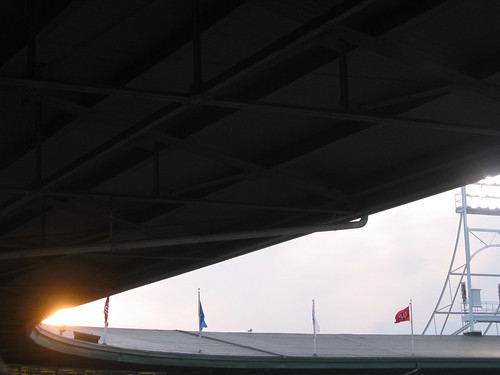
{Photo by rocketlass.}
Unexpectedly staying with the baseball theme from Saturday: if you find yourself at Wrigley Field for a game on a work day--and therefore without your usual seatmates--I recommend taking The Guermantes Way to read between innings. I go to a couple of dozen baseball games every year, and, as great art so often does, today The Guermantes Way helped me to experience the utterly familiar in a new way.
Nearly the whole second half of The Guermantes Way consists of the description of an evening at the salon of Madame de Guermantes, with whom Marcel has been fascinated to the point of obsession since childhood. Having finally, after much covert and overt effort, been granted entree to the hallowed precincts of the Guermantes salon, Marcel is disappointed--even astonished--to find it excruciatingly banal and superficial, a place of forced wit and petty social striving, where art has no value beyond its role as an easy indicator of sophistication.
For more than two hundred pages, Proust relates the conversation of Madame de Guermantes's batch of insecure nobles and society sycophants--a conversation that ought to be stultifying to the point of unreadability. But by presenting the evening from Marcel's perspective, at a remove yet tightly focused and deeply analytic, Proust reveals the pointless back-and-forth as a constant battle for position, almost a sporting event. With their every utterance the interlocutors attempt to stake out territory and establish credentials as thinkers, demonstrate their wit, or simply shore up their position as venerable nobility--all in an effort to worm their way into the good graces of their hostess. Nary a sincere word is uttered, and Marcel provides us with a fascinating and funny running gloss on it all. We end up simultaneously very glad that we're not there and very glad that Proust was.
It's yet another way that Proust wakes us up, makes us more alert to the stuff of life, whether it's the memory locked in a physical sensation, the secret lives led by people we thought we knew, or the usually unnoticed layers--pointless as they ultimately may be--underlying everyday conversation. The problem with reading that half of The Guermantes Way, however, is that for weeks afterwards, you're unable to overhear ordinary conversations in public without subjecting them to Marcel's skeptical analysis.
Wrigley Field proved no exception. By the end of the game, I felt as if I had overheard every tic and type of speech that Marcel discovered in the Guermantes salon. There were the statements designed to demonstrate the speaker's bona fides:
There's not a person alive who knows more about the Cubs of the '90s than I do.
I used to come here every day in the '80s.
There were the patently false statements offhandedly presented as truths:
Fonzie had three homers against the Sox in a game this summer.
Albert Pujols is good, but he's not as good as Ernie Banks.
A sacrifice is as good as a homer here.
That's Scott Rolen.
Diminutive nicknames were handed out with abandon: Fonzie, Rammy, D-Lee, and--least excusably--Rappy, for home plate umpire Ed Rapuano. Feeble attempts at wit were received as brilliant jests:
The Cardinals take it in their Pu-jols!
Go get some more HGH!
There was concern about changes in fashion:
Soriano's the only one out there who's got his socks up. He's the only one who looks like a ballplayer--all the rest of them look like slobs.
Think Carlos will wear his socks up for his next start? It worked last time.
Genealogy and pedigrees even came up for discussion:
You mean you didn't know that Todd Hundley's dad also played for the Cubs?
And, most Guermantes of all, it seemed to me--potential bon mots--
So Taguchi is so bad--were first floated quietly, almost furtively, then, depending on the reception in the nearest seats, repeated at top volume for the enjoyment of all.
All of which led me to try to imagine Proust as my seatmate. No doubt he'd have been disappointed with the food and drink on offer, uniformly terrible as they were, and both the fashion choices and the pedigrees of the crowd certainly left much to be desired--while the gray and clammy weather would surely have elicited worries about his health. But it's hard to imagine a spectator in the right frame of mind finding the eavesdropping any less than choice.
I love your double reading of conversation at Wrigley field and Guermantes' Way. Could it be that your understanding of staking territory and battling for position in the Guermantes salon were honed by your understanding of the game itself--the striking out for new territory and the desire to get home again? Marcel longed to get to Madame Guermantes' salon but the getting there was empty. Disappointment is always the rule in the Recherche--but fortunately not in baseball!
ReplyDeletethanks so much for this post, which made my day at the end of a long work week.
(message sent from the Durham Bulls Athletic Park).
The book is fiction, of course, but also tends to closely follow the persons and personalities of many real figures in French society during Proust's youth.
ReplyDelete